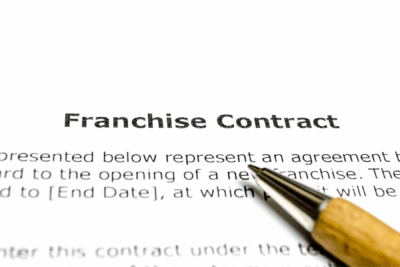For anyone considering franchise ownership, one of the most important legal documents you will encounter is the franchise agreement. This binding contract establishes the terms of your relationship with the franchisor, covering all aspects from initial fees to ongoing obligations. But many prospective franchisees ask the same question: what information is included in a franchise agreement?
This guide breaks down the core elements of franchise agreements, explains how they relate to the legally required Franchise Disclosure Document (FDD), and highlights why careful legal review is crucial before signing.
What Is a Franchise Agreement?
A franchise agreement is the contract that defines the rights and responsibilities of both the franchisor and franchisee. It governs how the business will operate under the franchisor’s brand, the fees to be paid, and the standards that must be maintained.
Because franchise agreements are legally binding and often long-term, understanding their terms is critical. Unlike casual business arrangements, these contracts leave little room for negotiation once signed, which makes legal review even more crucial.
What Information Is Included in a Franchise Agreement: Key Provisions
When asking what information is included in a franchise agreement, the answer lies in several recurring provisions found in nearly every contract. While agreements can vary by industry, these core franchise agreement terms are almost always included:
1. Initial Fees and Ongoing Royalties
Franchisees typically pay an upfront franchise fee and ongoing royalties, which are based on their revenue—these royalties fund brand development, marketing, and franchisor support. The agreement spells out the exact percentage or flat fee required.
2. Territory Rights
The contract defines whether the franchisee has exclusive or non-exclusive rights to operate in a specific geographic area. Territory restrictions prevent oversaturation but may limit expansion opportunities.
3. Training and Support
Most franchisors provide initial training programs and continuing support. The franchise agreement will outline the resources available, including operations manuals, technology platforms, and customer service support.
4. Operational Standards
Franchisees must adhere to the franchisor’s business model, encompassing branding, products, services, and day-to-day operational processes. The agreement enforces consistency across locations to protect the franchisor’s reputation.
5. Renewal and Termination Conditions
Franchise agreements are not indefinite. Contracts specify the length of the relationship, renewal options, and circumstances under which either party can terminate the agreement. Termination clauses typically address noncompliance, bankruptcy, or other material breaches of the agreement.
The Connection Between Franchise Agreements and the Franchise Disclosure Document
The Franchise Disclosure Document (FDD) is a federally required document, mandated under the Federal Trade Commission’s Franchise Rule, that franchisors must provide to prospective franchisees before any contract is signed. It includes background information about the franchisor, litigation history, and financial statements as required by the FTC.
It includes background information about the franchisor, litigation history, and financial statements, along with 23 specific disclosure items.
While the FDD provides disclosure, the franchise agreement establishes enforceable obligations. In other words:
- The FDD explains the system and risks.
- The franchise agreement binds you to specific terms and conditions.
Prospective franchisees should review both documents together to fully understand not only the commitments they are making but also the risks involved.
Why Understanding Franchise Agreement Terms Matters
Because franchise agreements are designed to protect franchisors, franchisees must carefully analyze the provisions. Common risks include:
- High ongoing fees that cut into profitability.
- Restrictive territory rights that limit growth.
- Strict operational requirements that reduce autonomy.
- Termination clauses that allow the franchisor to end the agreement with limited notice.
Understanding these franchise agreement terms can make the difference between long-term success and costly disputes.
Questions to Ask Before Signing
If you’re still wondering what information is included in a franchise agreement, one of the best approaches is to use the agreement itself as a checklist. Before signing, prospective franchisees should understand and ask:
- How are royalties calculated, and do they change over time?
- Is the territory truly exclusive, and can it be reduced later?
- What happens if the franchisor sells the brand or merges with another company?
- Can I sell or transfer my franchise if I need to exit the agreement?
- Are renewal terms the same as those in the original agreement, or will they be different?
Asking these questions ensures you understand the franchise agreement terms in practice, not just in theory.
How Franchise Agreements Differ by Industry
Not all franchise agreements look alike. While the core structure is similar, the industry can shape the emphasis on specific terms. For example:
- Restaurant franchises often include strict food sourcing, health code compliance, and supply chain requirements.
- Retail franchises may emphasize inventory standards, product display guidelines, and marketing contributions.
- Service-based franchises, such as cleaning or tutoring, typically focus on territory exclusivity and high customer service standards.
These differences underscore the importance of a thorough legal review. A clause that looks harmless in one industry may be burdensome in another. Understanding how your contract compares with industry norms can prevent long-term conflicts.
Common Legal Issues in Franchise Agreements
Even when franchisees comply with requirements, legal conflicts may still arise. Typical issues include:
- Disagreements over royalty calculations.
- Enforcement of non-compete provisions.
- Restrictions on transferring or selling the business.
- Disputes over territory encroachment by other franchisees.
Because these agreements often favor franchisors, franchisees benefit from having their contracts reviewed by legal counsel before signing. Attorneys can identify one-sided provisions, suggest revisions, and explain how state and federal law might affect enforceability.
How Cantrell Schuette Helps Franchisees
Franchise agreements represent one of the most significant commitments an entrepreneur will make. Once signed, the terms govern operations, financial obligations, and long-term growth. Without legal guidance, franchisees risk entering into agreements that undermine their profitability or limit their rights and obligations.
At Cantrell Schuette, our franchise attorneys specialize in reviewing and negotiating franchise contracts. We analyze the franchise disclosure document alongside the agreement to ensure clients fully understand what information is included in a franchise agreement, how each clause impacts their business, and whether revisions are possible. A thorough FDD review is crucial for uncovering potential risks, evaluating financial disclosures, and ensuring that the franchisor’s obligations are clearly defined. Our national franchise practice allows us to guide clients across industries, providing clarity and protection before they make a life-changing investment.
Protecting Your Rights Before You Sign
If you are evaluating franchise opportunities, you’ve likely asked: What information is included in a franchise agreement? The answer involves much more than fees or branding rights. From royalties and territory restrictions to renewal and termination conditions, these contracts define the entire business relationship between franchisor and franchisee.
Because the stakes are so high, understanding every detail and how it aligns with the franchise disclosure document is essential. A trusted franchise attorney can help ensure that your rights are protected and your investment is secure.
Whether you are purchasing your first franchise or expanding an existing portfolio, our team at Cantrell Schuette is here to provide the legal guidance you need. Contact us today to review your franchise agreement terms and move forward with confidence.



